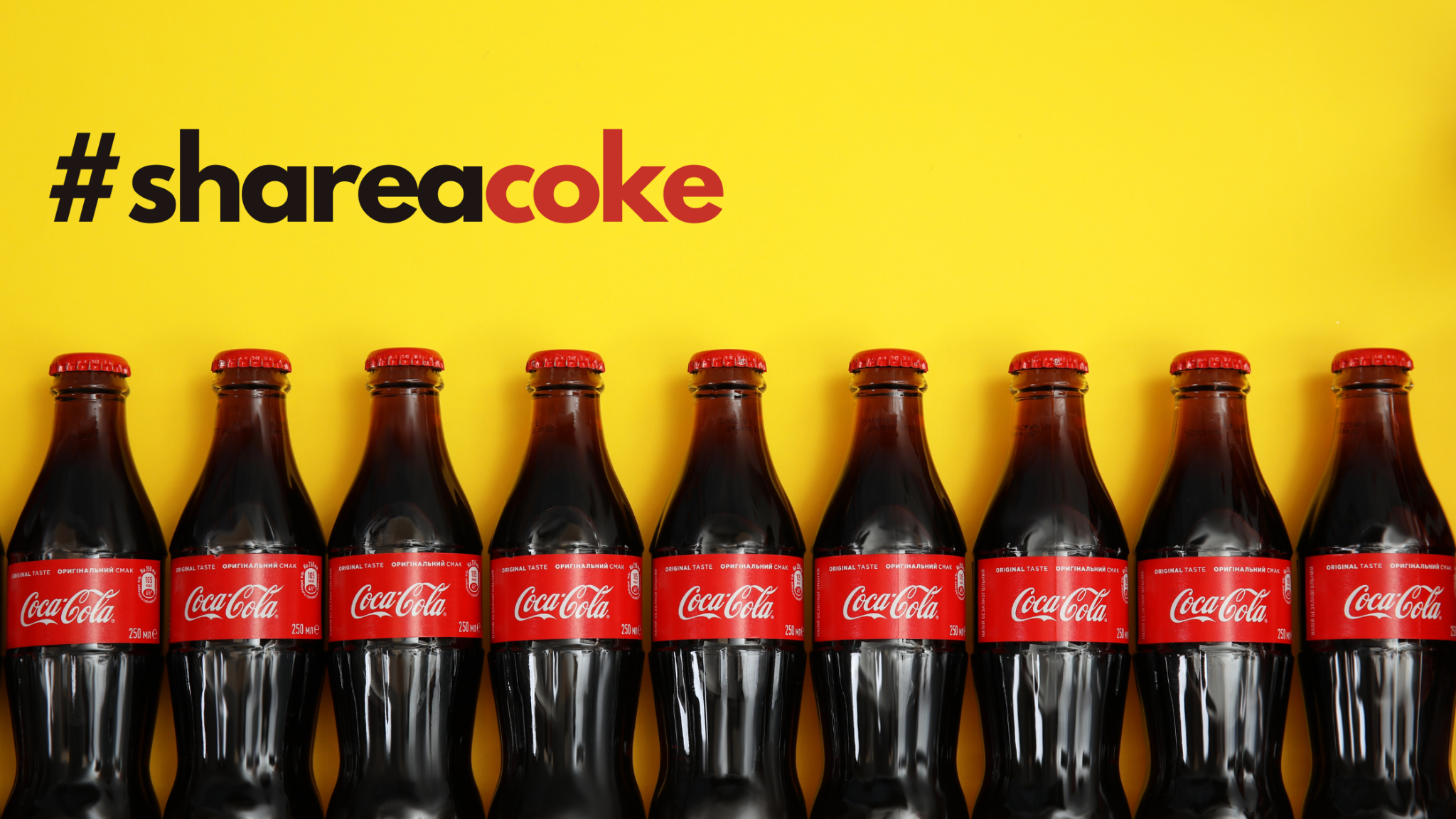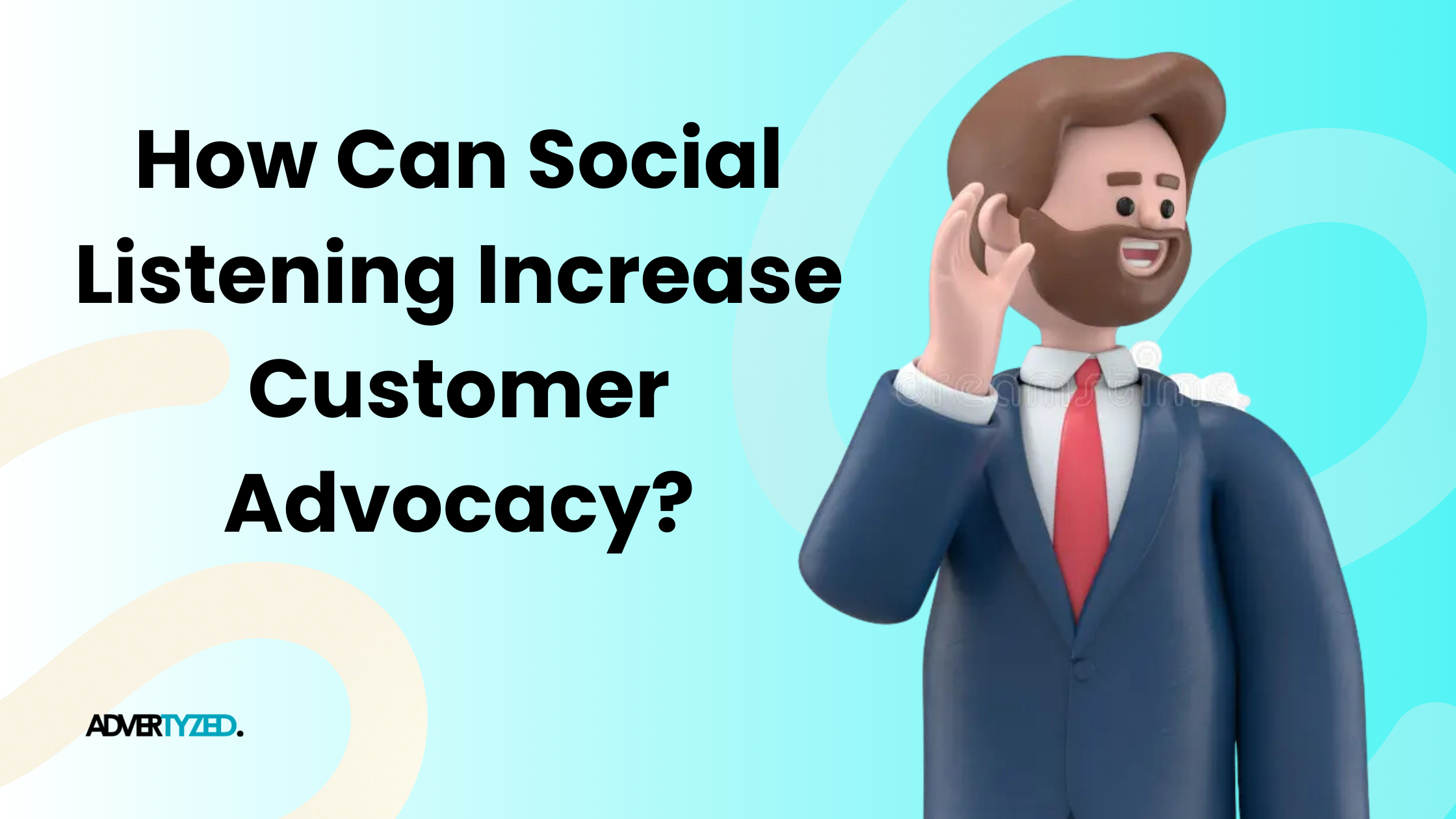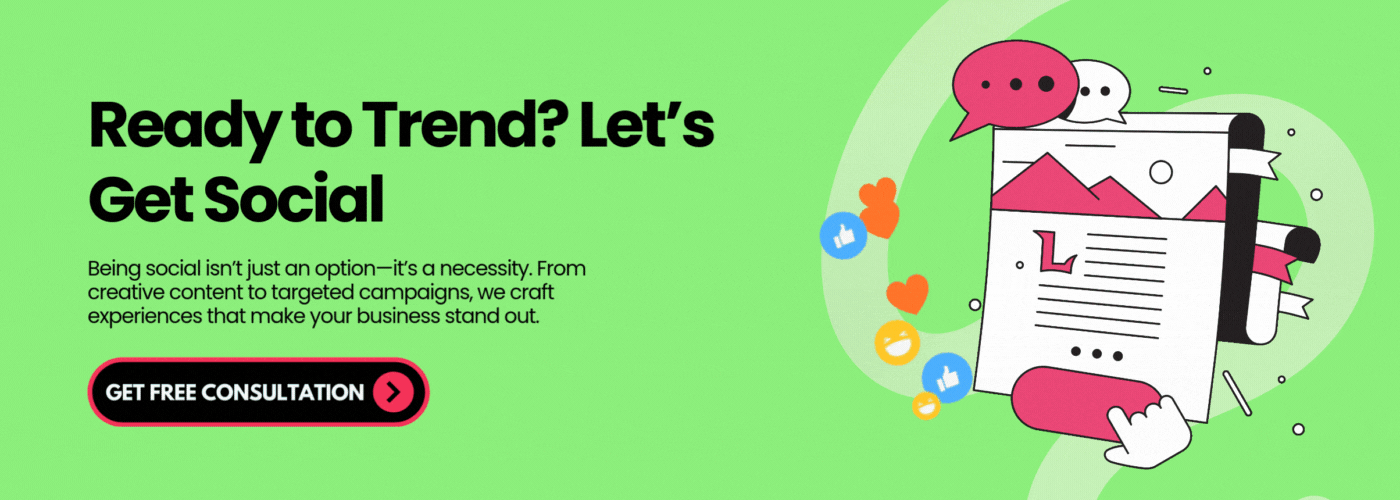Social media usage has tremendously increased over the years and brands are taking full advantage of this boom. From marketing their products by running ads on social media to earning their customer’s trust using social listening, every business is looking to make profit through the internet.
If you’re looking for more information on social media ads and marketing, check out our complete Social media marketing guide for small businesses. But for the sake of this blog post, we’ll focus on how can social listening increase customer advocacy and why is it important to listen to conversations about a brand?
What is Social Listening?
Before we dive into the depths of how can social listening increase customer advocacy, let’s first understand what Social listening is. Social media listening is a means for businesses and individuals to keep a track of discussions related to their products, services or brands.
It helps them amplify positive reviews or comments, intervene in situations when a customer had a bad experience and collect UGC (user-generated content).
What is UGC?
User-Generated Content refers to any form of content, such as photos, videos, reviews, testimonials, blogs, or social media posts, created by users or consumers rather than brands or professional creators. It is mostly organic and businesses usually collect it as a marketing strategy to build trust, engage audiences, and showcase real-life interactions with products or services.
There are various tools designed specifically for social media listening, such as Hootsuit, Brandwatch, Sprout Social, Talkwalker and more. These tools keep an eye on conversations about certain keywords, topics or hashtags that customers might have shared across different social media platforms, when discussing your product.
Think of these tools as your personal gossip collectors that informs you whenever someone talks about your brand. This way, you can not only address complaints about your product or service but also enhance your brand reputation by rewarding those who leave positive comments.
Still don’t think social media listening is beneficial? Here are a few famous social media listening examples to help you understand the practical aspects of this marketing technique.
Learn With Social Media Listening Examples

-
MoneyGram’s #CommentaryChallenge Campaign by Advertyzed
Social media listening is an excellent method of designing viral campaigns! In fact, our social media marketing team at Advertyzed used social listening to design a viral campaign for Moneygram! MoneyGram aimed to increase brand engagement, visibility, by collecting UGC for future remarketing efforts.
By utilizing social media listening insights, we created a tailored campaign titled #CommentaryChallenge, which encouraged participants to dub memorable moments from international cricket matches.
Leveraging MoneyGram’s association with global currency exchange and the ICC Champions Trophy 2017, the campaign resonated with cricket fans worldwide. It not only showcased MoneyGram’s brand values but also collected valuable UGC for future marketing initiatives.

2. Coca-Cola’s #ShareACoke Campaign
Coca-Cola’s #ShareACoke Campaign stands out among the top most lucrative social media listening examples to have ever been recorded.
Coca-Cola, a global beverage giant, launched its #ShareACoke campaign, aiming to engage customers and increase brand visibility by printing popular names on Coke bottles and cans, encouraging consumers to find and share their personalized Coke with friends and family.
To create the campaign, Coca-Cola’s marketing team used social media listening to identify trends related to personalized products, gifting, and social sharing behaviors among consumers. This insight helped them understand the growing interest in personalized products during certain months like Christmas.
In no time, the #ShareACoke campaign became a massive success, driving increased social media engagement, user-generated content, and brand advocacy. Customers not only bought their own personalized cokes but also encouraged others to do the same.
By leveraging social media listening insights, Coca-Cola successfully created a campaign that resonated with consumers, served as a customer advocacy marketing technique, and contributed to increased sales.
Moreover, with the help of social media listening tools, Coca-Cola addressed customer complaints about not finding their names on bottles and cans by printing more personalized names, further enhancing the campaign’s appeal and customer satisfaction.

3. Apple’s #ShotOniPhone Campaign
One of our personal fav social media listening examples is Apple’s #ShotOniPhone campaign. In 2015, Apple launched a groundbreaking initiative that showcased the power of social media listening.
The #ShotOniPhone campaign encouraged iPhone users worldwide to share their best photos captured using their iPhones, highlighting the device’s exceptional camera capabilities.
The campaign garnered an overwhelming response, with millions of iPhone users sharing their photos on social media using the campaign hashtag.
By leveraging social listening insights, Apple was able to curate a visually compelling gallery of user-generated content, showcasing the versatility and excellence of iPhone cameras.
This user-centric approach not only reinforced customer loyalty and advocacy but also positioned the iPhone as a preferred choice for photography enthusiasts worldwide.
Why Is It Important to Listen to Conversations About a Brand?
Eavesdropping on public conversations about a brand might seem scandalous, but it actually comes with numerous benefits. These conversations provide brands with honest and genuine feedback that can be utilized in crisis management and identifying areas that require improvement.
Moreover, businesses can keep up with emerging trends, topics of interest, and new opportunities. This information can guide product development, marketing strategies, and business decisions to stay ahead in the competition.
As a savvy approach, businesses can listen to conversations about their competitors and gain valuable insights into their strengths, weaknesses, and market positioning. With this information, they can enhance their performance, and grasp opportunities to set themselves apart in the market.
In essence, social media listening allows businesses to proactively manage their brand image. By addressing customer concerns, responding to feedback, and building connections, they can maintain a positive brand reputation and build trust with their audience.
What is Brand Reputation and How Does it Fit in Social Media Listening?
Brand reputation is the public perception of your business, and a strong one positively affects your customers’ buying journey. In addition, strong brand reputation boosts sales, and gains customer trust.
However, in order for businesses to make a name or reputation for themselves, it’s crucial to understand and manage certain factors that come into play. For instance:
Quality
The quality of products or services offered by a business plays a significant role in shaping its reputation. Naturally, delivering high-quality commodities can build trust among customers.
Customer Experience
A customer’s overall experience when interacting with a brand, including customer service, support and ease of use, greatly impacts brand reputation. Positive experiences lead to satisfied customers who are more likely to recommend the brand to their friends and family.
Media Coverage and Public Relations
Positive media coverage, captivating social media posts, PR campaigns, and endorsement by influencers can shape how the brand is portrayed in the media and perceived by the public. The more positive and appealing media coverage is, the more it enhances brand reputation.
Competitive Edge
How a brand compares to its competitors in terms of quality, pricing, customer service and creativity also influences its reputation within the industry and among consumers.
If you’re looking for ways to boost or manage your brand reputation, it’s critical for you to proactively monitor and address these factors, listen to customer feedback, adapt swiftly to market changes, and consistently deliver on brand promises.
A positive reputation can ultimately lead to increased customer advocacy marketing, customer loyalty, and long-term success. Don’t know what is customer advocacy marketing? For now, just know that it’s word-of-mouth marketing with extra push.
High customer advocacy leads to higher sales without marketing costs. Why? Because your customers do the marketing for you. For instance, most Apple customers purchase the new iPhone just because it’s made by Apple. Now that’s customer advocacy marketing 101.
If you still haven’t figured out how can social listening increase customer advocacy then keep reading. We’ll help you connect the dots between customer advocacy marketing and social listening, by gradually explaining every concept.
What is Customer Advocacy Marketing?
Customer Advocacy Marketing refers to marketing techniques which utilize customer satisfaction as a way to promote a brand, services or products. In other words, it’s a technique where you turn loyal customers into walking-talking billboards that endorse your brand to friends, family and others in their network.
But hey, don’t mistake this for being the same as hiring brand ambassadors. Brand ambassadors are typically individuals or influencers who are formally affiliated with the brand through a partnership or sponsorship. While brand ambassadors may be customers themselves, their role extends beyond personal advocacy and involves promotional activities as part of a formal agreement with the brand.
On the other hand, customer advocacy marketing focuses on creating a pool of satisfied clientele who voluntarily advocate for a brand. These customers share their personal experiences through word of mouth, social media posts, reviews and testimonials, compelling others to try out the brand too. In business terms, these customers and their reviews are solely organic rather than paid.
Let me explain it with an example.

Starbucks Rewards Program; Customer Advocacy Marketing At Its Finest!
If you’ve ever been to Starbucks, you probably know that when you buy coffee you get stars for every purchase. As your stars accumulate to a certain number, you can unlock multiple benefits like free drinks!
This reward program not only keeps customers coming back for more, but also turns them into an advocate for the brand.
Imagine, if you win a free drink on your birthday through this reward program, wouldn’t you share this delightful experience with your peers? We certainly would! And that precisely answers to what is Customer Advocacy Marketing.
All brands should learn something from Starbucks and figure out ways regarding how to increase customer advocacy.
Why Is Customer Advocacy Important?
Whether you belong to the fashion industry, tech, restaurant, hospitality or any other niche, customer advocacy has the potential to bring long term success and growth to your business.
Advocates are not just one-time-buyers; they remain loyal to a brand for years to come. Positive experiences, good quality products and services and rewards make customers feel valued and inclines them to continue purchasing from the brand.
Unlike traditional marketing methods that often require hefty investments and advertising campaigns, customer advocacy marketing is relatively cheaper and sustainable. It relies on leveraging existing customer relationships and positive experiences to turn customers into advocates, who bring in more sales with their word of mouth.
Potential customers are more likely to trust a brand recommended by someone they know or follow, leading to higher conversion rates and a stronger customer base. This ultimately gives brands a competitive advantage, setting them apart from others.
Moreover, a brand that truly understands what is customer advocacy marketing, is more likely to navigate crises and negative publicity with ease. In such situations, customer advocates can serve as brand defenders and their loyalty and positive sentiment can help mitigate reputational damage.
How Can Social Listening Increase Customer Advocacy?
Now that you know what is Customer Advocacy Marketing, brand reputation and social media listening, let’s get back to finding out How Can Social Listening Increase Customer Advocacy?
As you’ve already learned, through social media listening businesses can strive to enhance their brand reputation and ultimately increase customer advocacy too. This makes social media listening a form of customer advocacy marketing strategy which helps businesses strengthen their bond with customers. Here are a few more ways to further understand that How Can Social Listening Increase Customer Advocacy?
Aids in Identifying Advocates
The best answer to how to increase customer advocacy is by keeping an eye out for anyone sharing positive experiences, leaving glowing reviews, or actively engaging with the brand’s content on social media. Recognizing these advocates allows businesses to further nurture these relationships and encourage continued customer advocacy.
Offers Better Audience Insights
Social media listening provides valuable data and analytics that offer deep insights into audience demographics, preferences, behaviors, and sentiments. By reviewing conversations, trends, and interactions on social platforms, businesses can understand their audience’s needs, interests, and complaints, and focus on creating more targeted and effective customer advocacy marketing strategies.
Enhances Customer Experience
Social media listening enables businesses to actively engage with customers, respond to their feedback, and address their concerns in real time. This proactive approach to customer service improves satisfaction levels and enhances overall customer experience, leading to increased customer advocacy.
Monitors Competition
As we specified earlier in why is it important to listen to conversations about a brand, social media listening tools allow businesses to monitor and analyze their competitors’ activities, campaigns, and customer feedback. By tracking competitor mentions and engagement, businesses gain valuable insights into the industry landscape, identify areas that need focus, and adjust strategies to stay ahead in the market.
Crisis Management
Social media listening is crucial for effective crisis management. By monitoring conversations and detecting potential issues or negative sentiment early, businesses can respond swiftly, address concerns, and mitigate reputational damage. This swift and transparent handling of crises can help maintain customer advocacy and loyalty during challenging times.
Building Partnerships
Social media listening helps businesses identify and engage with potential partners, influencers, and customer advocates. By monitoring industry influencers, thought leaders, and key stakeholders, businesses can initiate meaningful partnerships, collaborations, and co-marketing opportunities that expand reach, enhance credibility, and drive mutual benefits.
Improves Brand Reputation
Social media listening plays a vital role in managing and improving brand reputation. Engaging with customers, acknowledging positive feedback, and resolving issues promptly contribute to building a positive brand image and fostering trust among stakeholders.
Bonus Social Media Listening Tips to Enhance Customer Advocacy
If you’re using social listening tools and come across a comment about your brand, what’s your next move? How to increase customer advocacy by utilizing these comments? First of all, classify these comments into different categories and take actions accordingly! Here are some bonus tips to help you put your social media listening tools to use.
Positive Comment
When you come across a positive comment about your brand, product or service, consider reaching out to the commenter. Politely ask if they would be interested in sharing your blog with their network, as it could be valuable to others as well.
Moderate Comment
When engaging with moderate comments, consider reaching out to the commenter and offering them a free sample of your product. You can also ask if they would be willing to do a product review, as their feedback is invaluable to your brand.
Bad Comment
In the case of negative comments, it’s essential to handle them with care. Instead of arguing or simply refunding and apologizing, take the opportunity to understand the customer’s concerns. Address their issues promptly and offer solutions or alternatives. This proactive approach can help turn a negative experience into a positive one and improve customer satisfaction.
Need Help With Enhancing Your Brand’s Customer Advocacy? Look no further than Advertyzed!
At Advertyzed, we understand why is it important to listen to conversations about a brand and how it impacts on your brand’s growth. That’s why we offer a comprehensive range of social media marketing services tailored to amplify your brand’s presence and engage with customers effectively.
From social media listening and analysis to ad campaigns and influencer partnerships, we have the tools and expertise to drive advocacy and loyalty for your brand.
We prioritize putting your customers first, focusing on getting to know your audience, what they like, and how they interact with your brand. This enables us to create tailored plans to encourage advocacy among your customers.
Get in touch with us to discuss your social media marketing needs and start your journey towards enhanced customer advocacy and success!



